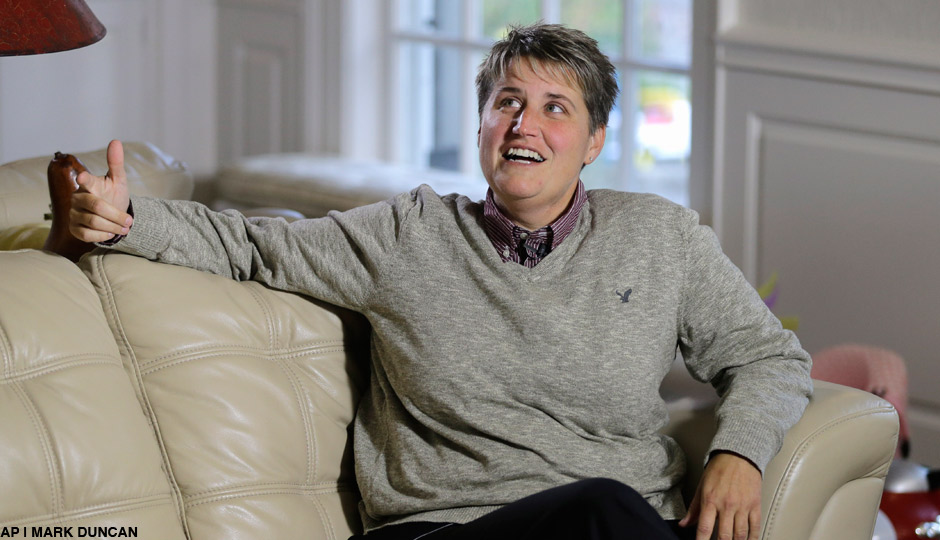Wrong-Sperm Suit Is Really About the Burden of Being Black
Same-sex Ohio couple, unwitting parents of a mixed-race child, want $50,000 in damages.

Jennifer Cramblett is interviewed at her attorney’s home in Waite Hill, Ohio, Wednesday, Oct. 1, 2014. Cramblett has sued a Chicago-area sperm bank after she became pregnant with sperm donated by a black man instead of a white man as she’d intended.
A same-sex couple in Ohio is suing a Chicago-area sperm bank for wrongful birth and breach of warranty after receiving the wrong sperm, resulting in the birth of a mixed-race baby girl, Payton.
Payton’s mother, Jennifer Cramblett, has said that she and her partner will now have to relocate from their Uniontown, Ohio, farm town to a more diverse area in order to ensure that Payton is comfortable. Cramblett cites that their current community is mostly white and conservative, and notes racial intolerance in her own family.
Baby Payton is two years old. While it is admirable that her parents have noted their own shortcomings in their ability to care for a child of color (cultural understandings, or even more basic needs like hair care) the lawsuit is about a little more than negligence. And let us be clear, Midwest Sperm Bank certainly seems grossly negligent.
Payton’s parents want compensation for the inconvenience of living a black life.
They now have to move to a place where they can be sure that no one will harass them because of the color if Payton’s skin. They have to do research on which neighborhoods have amenities in them (or nearby) to satisfy their child’s specific cultural needs. Even as Cramblett acknowledged her own challenges as a lesbian in the Uniontown community where she’d chosen to stay, she acknowledges that the burden of blackness is too much to bear.
According to reports, Cramblett and her partner, Amanda Zinkon, have referenced that they’ve already had uncomfortable conversations because of Payton’s appearance. Regardless of how uncomfortable these conversations are, I wonder if the couple realizes that they are largely inescapable, regardless of where they choose to live, at least for Payton. These conversations will likely continue to be a part of Payton’s experience as a black woman, whether in the form of inquiries about her hair texture, or other mindless wonderings, such as whether people of a darker hue can get a suntan. (Really. I cannot tell you how many times, in my almost-30 years on this planet, someone has said to me, “I didn’t know you could get darker!”)
As I’ve written in this column before about the nature of the housing market, blackness is a burden that many non-blacks seek to avoid. While Cramblett and Zinkon avow love and support to their daughter, they are acknowledging outright that their lives will and must change because of their mixed-race child.
Take that, post-racialism.
Perhaps this is also why black babies cost less to adopt. Black children are a quick get in the system, where waiting parents are in longer lines for Latino, Asian or white children. Perhaps this is the price of a child. A price that baby Payton’s family is paying, like it or not.
Follow @MF_Greatest on Twitter.


